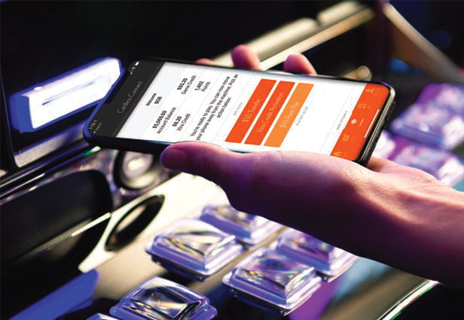Cashless Crescendo

Every time you use a debit card to buy a couple of books at Barnes & Noble, you’re going cashless. Every time you tap your card at Giant for groceries, you’re going cashless. When you hand your MasterCard to an Old Navy cashier—notice the word “cash” in the job title—you’re going cashless. When you order dinner delivered by DoorDash through a phone app, you’re going cashless.
Yes, the world has embraced a cashless society for several years running.
But a segment of the patrons who visit casinos—most of whom have no qualms with any of the aforementioned transactions—have been slower to catch on to the same cashless world inside gambling resorts.
“The industry itself was built on cash, and so it’s more of a foundational change,” Koin President Gary Larkin says.
Sometimes old habits die hard. But they do pass on. In recent years, gamblers have fed bills into slot machines, and when they “cashed” out, the machine spit out a ticket instead of cash. Ticket-in/ticket out (TITO)—cashless. Still in play today. The musical clink and clatter of coins dropping into the hopper, piped in.
“The (TITO) system, in many ways, serves as a precursor to cashless payments,” Larkin says.
It’s not just reluctance on the part of casino-goers that delays acceptance by some. Gaming is such a highly regulated industry that by its nature it has to jump through regulatory hoops to move forward. The same holds true for the other partner in a cashless casino world—the banking industry.
“Companies that supply the casinos with gaming- or revenue-related equipment or software must be licensed as casino service industry enterprises,” says Allison Inserro, a spokeswoman for the New Jersey Division of Gaming Enforcement (DGE). “The hardware or software must also be submitted to DGE’s Technical Services Bureau for testing to review and analyze the product.”
The DGE also works with the New Jersey Department of Banking and Insurance to ensure that the providers of cashless systems have obtained proper licensure, Inserro says.
In the context of the gaming industry, cashless transactions refer more often to in-person casino resorts. Within the confines of the resorts, you have a multitude of products, services and cash equivalent options spread out across your entertainment experience, says Victor Newsom, senior vice president, product management, payments solutions for Everi.
“Gaming’s home base has always been physical casinos, so it’s natural that cashless would start there,” Larkin says.
But a lot of activity and interest is moving toward other avenues like online gaming, sports wagering, e-sports, and more, he says. “Cashless technology was developed to improve the consumer and operator experience, and so as more activity moves toward those other sectors, cashless will ultimately follow suit.”
Help Me, Help You
Cashless systems have a broader calling beyond convenience for players.
“They allow casino operators to better understand their customers’ behavior, which can be important from anti-money laundering and responsible gambling standpoints,” says Josh Swissman, managing director and founding partner at GMA Consulting.
For many reasons, some regulatory, some security-related, the cashless transformation of gaming at its most intimate level requires additional echelons of protection. Swiping or tapping a card alone doesn’t cut it.
“What companies in our sector have done is develop an ‘intermediate’ step between the consumer’s account and the gaming floor that comes as close as possible to a simple tap or swipe while staying within all regulations and security standards,” says Steve Ritchie, Pavilion Payments’ chief revenue officer.
Solutions like Pavilion Payments’ VIP Mobility app, launched in 2021, allow patrons to fund games—and eventually entertainment, food, and other non-gaming goods and services— by scanning QR codes at the slot machine or table game from their mobile device, which is a familiar way to offer a cashless experience.
By linking their VIP Preferred account to the VIP Mobility app, customers can connect as many as four checking accounts to their play. “With a single sign-up, they gain access to more than 400 in-person and online gaming institutions across the U.S.,” Ritchie says.
The process of using a Koin digital wallet in the gaming space is functionally similar to using an app on your mobile device to purchase something at a store. Your bank account or other preferred payment is linked to the digital wallet, and you can use it to pay for specific property services—from gaming to dining to show tickets, Larkin says.
Everi has focused on cashless products for more than a decade, pre-dating a lot of the latest systems in terms of solutions that digitally bring funds to the floor, Newsom says. The company was considered the first to meet EMV standards—Europay, MasterCard and Visa—for all card activity in 2015.
“The convergence of online, land-based mobile and fixed land-based gaming as well as venue integration and retail access has really blurred the lines,” Newsom says. “I can load money to my online wallet using cash at a CVS and get cash out at the casino.”
Like other service providers, Everi has introduced a variety of cashless products. CashClub Concierge offers options for table game play. CashClub Wallet funds gaming, retail, online services, hotel and food/beverage as well as store credit and debit card services. “CashClub Wallet also enables cash withdrawals and TITO for those who want a more tangible instrument,” Newsom says.
Covid-19 accelerated the cashless process as a catalyst, he says. “Covid aligned regulators, operators, suppliers and patrons around cashless value.”
Still, cash metrics continued to grow across the industry even as companies such as Everi converted acceptance of cashless systems by double-digits, with transactions worth billions.
“The choices have expanded dramatically beyond TITO and continue to do so as regulatory evolution, technology investments and banking solutions expand,” Newsom says.
CashClub Wallet supports cards, bank accounts, PayPal, Apple Pay, cryptocurrency, even gift card liquidation services to quickly and easily fund an account within any budget limits.
Adaptability is one of the best features of the Koin digital wallet experience, Larkin says. A customer can add a bank account or any of a multitude of preferred payment options, depending on operator capability and need.
There are certification and regulatory barriers that make it difficult to rely solely on bank and credit cards for the gaming experience, which would detract from the convenience side. And the Koin digital wallet makes several different payment options available, along with detailed spending tracking capabilities, addressing both efficiency concerns and security concerns head-on, Larkin says.
VIP Mobility digitizes the TITO ticket. “Patrons can scan their winnings directly by quickly scanning the ticket into the app. They have the option to leave their funds in their app balance or transfer it directly to their bank accounts if they link their VIP Preferred account,” Ritchie says.
Bank or debit cards alone cannot provide the seamless and integrated experience that VIP Mobility offers, Ritchie says. “Our app allows customers to fund their slot or table games directly from their mobile phones, and by linking their VIP Preferred account to the app, patrons can transfer their winnings directly to their bank account. This level of integration and immediacy is unmatched by traditional bank or debit cards.”
In theory, cashless can mesh well with different products throughout the property—with the right partners.
“Unfortunately, we have seen operators that lack a cohesive digital strategy settle for point solutions from multiple vendors, and the result does not mesh. Worse, as our data and consumer studies across many industries show, true value to patrons requires that mesh to be real,” Newsom says.
Companies such as Everi exist at the intersection between bank regulations and gaming regulations, as both a licensed gaming company and a licensed money transmitter. “We use the same banking switch infrastructure used by some of the largest banks in the U.S. at the same time that we are acting as the merchant of record for transactions,” he says.
Yet each consumer segment will key off different factors, and those will determine how well or poorly adoption, usage, performance and other metrics do, Newsom says. “Consumers are increasingly looking for convenience, real-time payments, lower costs, better experiences… as you would expect. We have certainly seen amazing response from patrons in our own CashClub Wallet across many properties, but I would still say it is early in the adoption cycle as many operators and regulators are wrestling with change.”
With all that said, there will always be a segment of the gambling population that prefers more traditional forms of payment, like cash, Swissman says. “Although, I believe that segment will continue to shrink, especially as cashless payment technologies become more intuitive and integrated into the existing gambling experience.”
It’s a matter of player preferences. “We strive to provide solutions to appeal to all of them,” Ritchie says. “Some patrons prefer playing with cash, so we offer our VIP Financial Center kiosks. These kiosks are powered by VIP Preferred and allow players to utilize ATM, TITO tickets, cash advance, and e-check services. However, we see that VIP Mobility adoption is growing as cashless technology becomes more common in other aspects of life.”
The introduction of most new technology follows a similar path, Koin’s Larkin says. “There are early adopters who are eager to be at the forefront of the next evolution, and those who may be a bit more reluctant to cast aside systems they’ve grown used to over the years. What tends to happen is that as the early adopters embrace the technology, those who may have hesitated to jump aboard are able to see real, tangible evidence of its success, and become more encouraged themselves to join us. So overall, change can certainly be slow, especially big change.”
Working Out the Kinks
Patrons also have their apprehensions.
Convenience, friction, costs… these continue to be issues people have concerns about, and they vary by jurisdiction and property for a myriad of reasons, Newsom says. The status of remote enrollment. Presence of a content management system. Ease of moving funds. Provider licensing. Fees to load a wallet. Are funds held for any length of time? Ease of access. Is there a deposit or spend limit?
Seeing technological advancements in action tends to magnify the importance of making improvements in other areas, Larkin says. “So, when a customer, for example, is impressed by how much more convenient Koin makes their gaming experience, it leads them to think: Now, why can’t these other improvements that are important to me happen, too? And in a way, that’s a positive thing, because cashless technology was developed to improve the customer and operator experience, so we are eager to learn what areas they feel are important to improve upon.”
Pavilion Payments uses VIP Preferred’s bank-grade security to ensure swift and secure transactions, protecting patrons’ information, Ritchie says. “Our integrated system seamlessly connects casinos, financial institutions and gaming platforms, both on-site and online. Our comprehensive security measures reduce vulnerabilities and enhance data protection across all payment channels. VIP Mobility employs stringent controls and additional checks to prevent fraud, ensuring a secure user environment.”
Gaming is one of the most highly regulated industries in the country, and each jurisdiction can potentially have its own rules and regulations.
“We use this to our customers’ and partners’ advantage, though,” Larkin says. “With individual jurisdictional regulations varying not just in fact but by degree, we build our technology according to the strictest safeguards, across all jurisdictions. On top of all that, our technology is regulated by separate, very strict federal banking laws designed to protect customer data. Between the two, we are ensuring that we have the strictest technical safeguards possible in place.”
The easier it is for someone to engage with cashless technology, the higher its adoption rate will be, Swissman asserts.
As with all things in life, practice makes perfect, Larkin says. “The more integrations that occur, the more we’re all able to learn and improve—both by replicating best practices and knowing what to improve upon if we do encounter inefficiencies.”

